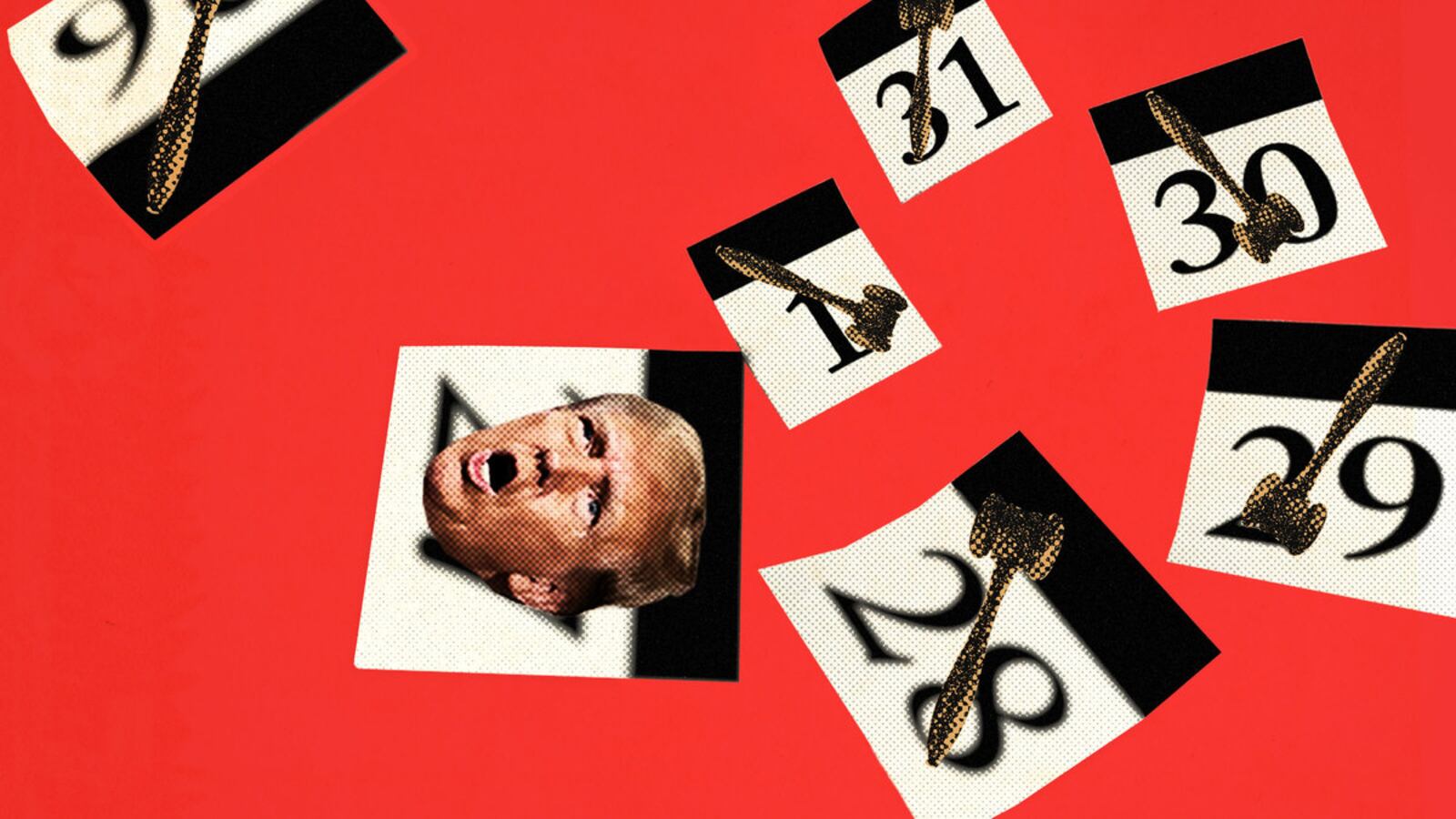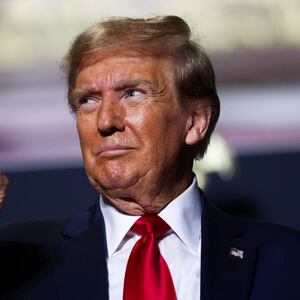Having secured his third straight Republican presidential nomination, Donald Trump should be firing up his jet to storm the campaign trail.
Instead, he’s preparing to spend the next two months inside a courtroom.
Although he’s been leading President Joe Biden in polling, Trump is far behind in fundraising, and he desperately needs to make up a cash discrepancy that could hobble his 2024 campaign.
There’s just one big problem: Trump is going to have to park his jet in New York for the crucial early months of the presidential campaign, thanks to his upcoming trial in Manhattan court.
Once the Stormy Daniels hush money trial begins on March 25, the former president will be in court four days a week for much of the subsequent two months. His only free day to leave the city for campaigning and fundraising will be Wednesdays.
The trial schedule will be an unprecedented constraint on a leading presidential campaign. But a senior Trump adviser told The Daily Beast that the campaign is preparing to make the most out of their midweek respite, looking to get Trump out of Manhattan and into battleground states as much as possible on Wednesdays and weekends.
Some of these trips, according to the senior adviser and other Trumpworld sources familiar with the early planning, will involve fundraisers separate from the traditional MAGA rally—a notable strategic shift. Trump’s rallies in the early primary states almost always had a V.I.P. area where big donors could schmooze with campaign staff and Trump himself. And Trump has also reportedly been hesitant to travel for the sole purpose of fundraisers, according to Puck.
But instead of donors coming to Trump, it’ll increasingly be the opposite as Trump tries to lure donor dollars.
The former president, campaign sources insist, is itching to get out in the country as much as he can under the new constraints.
“Do not underestimate Donald Trump and his desire to get out there and campaign,” a senior Trump adviser told The Daily Beast.
The senior Trump adviser also said to expect the former president to embrace an even more unconventional campaign style. While the MAGA rallies will still be important, they said, Trump will embrace “unprecedented methods” to reach voters as part of the campaign’s longer standing plans around national offensive to get him on the road more aggressively in the general election.
The campaign declined to elaborate on what those methods will be, but both the senior adviser and other Trumpworld sources indicated the campaign would complement the traditional rally format with other types of events, both online and in-person.
It’s not the first time in this campaign that Trump will experience a genuine impediment to his ability to campaign as a normal presidential candidate. In reality, he has never been a normal presidential candidate, thanks in part to the 88 felony charges and nine-figures in civil judgments against him. But the optics of the next two months alone will underscore just how abnormal it all is.
To Republicans who raised warnings about the risk of nominating someone with such extensive legal baggage in a tight presidential election, this spring will be filled with plenty of told-you-so moments.
“Republicans were warned, but they decided they’d rather go with the guy with [88] pending felony charges who will be campaigning between court dates,” Alyssa Farah Griffin, co-host of The View and a former Trump White House communications adviser, told The Daily Beast in a text message.

Griffin, who was a Nikki Haley supporter before the former South Carolina governor dropped out earlier in March, couldn’t help but point to the path not taken.
“They could have had a candidate like Nikki Haley who would have spent the next eight months crisscrossing the country making the case to voters and boosting other Republicans,” she said. “If Republicans lose the House and the Senate—which skews in their favor—they’ll have themselves and Trump to thank.”
The Trump campaign may hope the punishing legal schedule pushes voters to sympathize with Trump’s claims of victimization by the justice system, but it’s hard to spin how daunting the logistics will be.
Trump will have to appear in court from 9:30 a.m. until 4:30 p.m. every Monday, Tuesday, Thursday, and Friday for weeks, sitting at a table in front of New York Supreme Court Justice Juan Merchan as prosecutors lay out evidence that the former president tried to interfere with the 2016 election by engaging in a coverup.
With that schedule, Trump will have trouble campaigning on his available Wednesdays, which the judge set aside to catch up on all his other pending cases.
The Manhattan District Attorney’s Office’s theory of the case rests on the idea that Trump faked business records to hide the money he funneled to a porn star in the weeks before the 2016 election in an effort to avoid a campaign-busting scandal.
As such, prosecutors are expected to question several high-profile witnesses—like former Trump lawyer and confidant Michael Cohen, one-time Trump accounting guru Allen Weisselberg, former National Enquirer publisher David Pecker, and Daniels herself—and sort through reams of documents it received from the Trump Organization.
That testimony will take significant time to present in court, particularly as prosecutors retrace the steps Trump took to hide the payments, then zoom out to make the broader point that the entire scheme was directly meant to benefit his presidential campaign.
While it’s impossible to predict exactly how long the trial will go, current estimates have it stretching until mid- or late May—perhaps even longer than that.
At a pretrial hearing last month, discussions between the Manhattan DA’s Office and defense lawyers revealed that jury selection alone could take as long as two weeks. The process is poised to be especially grueling, as Trump’s team scrutinizes potential jurors for any indication of bias—a heightened concern for them in largely liberal New York City.
During that pretrial hearing, prosecutor Joshua Steinglass said his team would need “15 to 17 court days” to present its case—though that doesn’t even include the testy exchanges expected during cross-examination of witnesses. On that time table, Trump’s side would only start laying out its version of events, perhaps by May 6. But that’s assuming the judge ignores the Trump legal team’s request that they take a week-long break for the Jewish holiday of Passover in April.
Last month, Trump lawyer Todd Blanche pleaded with the judge for a few days off in late April, citing the immense strain on any parent serving as a juror who would have to arrange for childcare during the New York City school system’s spring break. Justice Merchan wasn’t receptive to that idea and seemed bothered by the notion of pausing the trial for more than a week stretching from Monday, April 22 until the following Tuesday, April 30.
By all accounts, then, Trump will be stuck in Room 1530 of the criminal courthouse in Lower Manhattan for most of the spring.
That’s actually a legal requirement. Under a New York law relating to criminal procedures, “a defendant must be personally present during the trial.” There’s an exception if Trump’s lawyers make a formal request to the judge, but even then the Manhattan DA is in a position to object.
Ironically, Trump’s only other option for escape is to act like an indignant toddler—and keep up the courtroom antics he displayed during two recent trials at government buildings just a few blocks away. In those other cases, Trump would angrily grumble about his feelings that the proceedings were unfair and, in one instance, even ignored a federal judge’s warnings to stop discussing inappropriate matters in front of the jury.
At his three-month civil bank fraud trial in state court last fall, Justice Arthur F. Engoron had to reprimand Trump for his unruly behavior. And at the journalist E. Jean Carroll’s rape defamation trial against the former president in January, U.S. District Judge Lewis Kaplan had to sternly lecture Trump to shut his mouth—at one point threatening to eject him from the courtroom.
New York law dictates that “a defendant who conducts himself in so disorderly and disruptive a manner that his trial cannot be carried on with him in the courtroom may be removed” if he keeps it up after ignoring a warning from the judge.
That means Trump has the perverse incentive to act out in court, because it could get him right back on the campaign trail—that is, if he manages to anger Justice Merchan enough to warrant removal but not a temporary trip to the slammer.
In the aftermath of the Daniels case, Trump will likely start the summer with a short break from courtrooms and be able to hit the road. But that path could look markedly different depending on the outcome of this first criminal trial.
If he's acquitted in New York, he’ll have perhaps a few weeks before starting a federal trial in Washington, D.C. for election interference or one in Florida for hoarding documents at Mar-a-Lago. That is, if the Supreme Court doesn't eviscerate the cases first.
But if New York jurors find him guilty, he might only have a short time before getting sentenced to imprisonment—taking him off the campaign trail entirely.
The Stormy Daniels matter is a felony criminal trial, and Trump faces one to four years in prison, according to a recent analysis by legal scholar Norm Eisen. But it has yet to be seen how the state judge will treat someone who is technically a first-time criminal offender—who just so happens to have racked up a history of civil fraud cases tied to his businesses.
Either way, Trump is still expecting another lengthy trial or two after this one.








